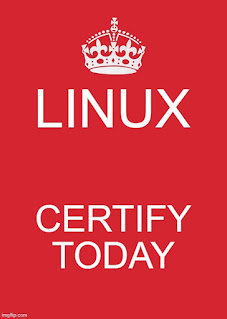The complete syllabus for the Linux certification course you need to know before start preparation for the test.
List of Course Contents
- The Linux community and a career in open source
- Finding your way on a Linux system
- The power of the command line
- The Linux operating system
- Security and file permissions
Topic 1: The Linux Community and a Career in Open Source (weight: 7)
1.1 Linux Evolution and Popular Operating Systems
-
Weight: 2
-
Description: Knowledge of Linux development and major distributions.
-
Key Knowledge Areas:
-
Open Source Philosophy
-
Distributions
-
Embedded Systems
-
The following is a partial list of the used files, terms and utilities:
-
Android
-
Debian, Ubuntu (LTS)
-
CentOS, openSUSE, Red Hat
-
Linux Mint, Scientific Linux
1.2 Major Open Source Applications
-
Weight: 2
-
Description: Awareness of major applications as well as their uses and development.
-
Key Knowledge Areas:
-
Desktop Applications
-
Server Applications
-
Development Languages
-
Package Management Tools and repositories
-
Terms and Utilities:
-
OpenOffice.org, LibreOffice, Thunderbird, Firefox, GIMP
-
Apache HTTPD, NGINX, MySQL, NFS, Samba
-
C, Java, Perl, shell, Python, Samba
-
dpkg, apt-get, rpm, yum
-
Related: How Linux is Most Popular Operating System
1.3 Understanding Open Source Software and Licensing
Weight: 1
Description: Open communities and licensing Open Source Software for business.
Key Knowledge Areas:
Licensing
Free Software Foundation (FSF), Open Source Initiative (OSI)
Terms and Utilities:
GPL, BSD, Creative Commons
Free Software, Open Source Software, FOSS, FLOSS
Open Source business models
1.4 ICT Skills and Working in Linux
Weight: 2
Description: Basic Information and Communication Technology (ICT) skills and working in Linux.
Key Knowledge Areas:
Desktop Skills
Getting to the Command Line
Industry uses of Linux, Cloud Computing and Virtualization
Terms and Utilities:
Using a browser, privacy concerns, configuration options, searching the web and saving content
Terminal and Console
Password issues
Privacy issues and tools
Use of common open source applications in presentations and projects
Return to Top
Topic 2: Finding Your Way on a Linux System (weight: 9)
2.1 Command Line Basics
Weight: 3
Description: Basics of using the Linux command line.
Key Knowledge Areas:
Basic shell
Command line syntax
Variables
Globbing
Quoting
Terms and Utilities:
Bash
echo
history
PATH env variable
export
type
2.2 Using the Command Line to Get Help
Weight: 2
Description: Running help commands and navigation of the various help systems.
Key Knowledge Areas:
Man
Info
Terms and Utilities:
man
info
Man pages
/usr/share/doc/
locate
2.3 Using Directories and Listing Files
Weight: 2
Description: Navigation of home and system directories and listing files in various locations.
Key Knowledge Areas:
Files, directories
Hidden files and directories
Home
Absolute and relative paths
Terms and Utilities:
Common options for ls
Recursive listings
cd
. and ..
home and ~
2.4 Creating, Moving and Deleting Files
Weight: 2
Description: Create, move, and delete files and directories under the home directory.
Key Knowledge Areas:
Files and directories
Case sensitivity
Simple globbing and quoting
Terms and Utilities:
mv, cp, rm, touch
mkdir, rmdir
Return to Top
Topic 3: The Power of the Command Line (weight: 9)
3.1 Archiving Files on the Command Line
Weight: 2
Description: Archiving files in the user home directory.
Key Knowledge Areas:
Files, directories
Archives, compression
Terms and Utilities:
tar
Common tar options
gzip, bzip2
zip, unzip
3.2 Searching and Extracting Data from Files
Weight: 3
Description: Search and extract data from files in the home directory.
Key Knowledge Areas:
Command-line pipes
I/O re-direction
Basic Regular Expressions ., [ ], *, ?
Terms and Utilities:
grep
less
cat, head, tail
sort
cut
wc
3.3 Turning Commands into a Script
Weight: 4
Description: Turning repetitive commands into simple scripts.
Key Knowledge Areas:
Basic shell scripting
Awareness of common text editors
Terms and Utilities:
#! (shebang)
/bin/bash
Variables
Arguments
for loops
echo
Exit status
Return to Top
Topic 4: The Linux Operating System (weight: 8)
4.1 Choosing an Operating System
Weight: 1
Description: Knowledge of major operating systems and Linux distributions.
Key Knowledge Areas:
Windows, Mac, Linux differences
Distribution life cycle management
Terms and Utilities:
GUI versus command line, desktop configuration
Maintenance cycles, Beta and Stable
4.2 Understanding Computer Hardware
Weight: 2
Description: Familiarity with the components that go into building desktop and server computers.
Key Knowledge Areas:
Hardware
Terms and Utilities:
Motherboards, processors, power supplies, optical drives, peripherals
Hard drives and partitions, /dev/sd*
Drivers
4.3 Where Data is Stored
Weight: 3
Description: Where various types of information are stored on a Linux system.
Key Knowledge Areas:
Programs and configuration, packages and package databases
Processes, memory addresses, system messaging and logging
Terms and Utilities:
ps, top, free
syslog, dmesg
/etc/, /var/log/
/boot/, /proc/, /dev/, /sys/
4.4 Your Computer on the Network
Weight: 2
Description: Querying vital networking configuration and determining the basic requirements for a computer on a Local Area Network (LAN).
Key Knowledge Areas:
Internet, network, routers
Querying DNS client configuration
Querying Network configuration
Terms and Utilities:
route, ip route show
ifconfig, ip addr show
netstat, ip route show
/etc/resolv.conf, /etc/hosts
IPv4, IPv6
ping
host
Topic 5: Security and File Permissions (weight: 7)
5.1 Basic Security and Identifying User Types
Weight: 2
Description: Various types of users on a Linux system.
Key Knowledge Areas:
Root and Standard Users
System users
Terms and Utilities:
/etc/passwd, /etc/group
id, who, w
sudo, su
Related: Top Daily Use Linux Commands
5.2 Creating Users and Groups
Weight: 2
Description: Creating users and groups on a Linux system.
Key Knowledge Areas:
User and group commands
User IDs
Terms and Utilities:
/etc/passwd, /etc/shadow, /etc/group, /etc/skel/
id, last
useradd, groupadd
passwd
5
.3 Managing File Permissions and Ownership
Weight: 2
Description: Understanding and manipulating file permissions and ownership settings.
Key Knowledge Areas:
File/directory permissions and owners
Terms and Utilities:
ls -l, ls -a
chmod, chown
5.4 Special Directories and Files
Weight: 1
Description: Special directories and files on a Linux system including special permissions.
Key Knowledge Areas:
Using temporary files and directories
Symbolic links



.jpg)

Comments
Post a Comment
Thanks for your message. We will get back you.